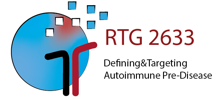Carolin Schmidt
Autoantibody-mediated effects on endothelial and immune cell signalling in systemic sclerosis
Systemic sclerosis (SSc) is a chronic, multisystem connective tissue and autoimmune disease with the highest case-specific mortality and complications among rheumatic diseases. SSc usually initiates with vascular injury and endothelial activation, which is followed by inflammation, production of autoantibodies (Abs) directed against several antigens including G protein-coupled receptors (GPCRs), and immune cell recruitment into the tissue, leading to vasculopathy and fibrosis. Among the large variety of Abs present in the sera of patients suffering from SSc, functionally active Abs against angiotensin II type 1 receptor (ATR1) are found in approximately 85% of SSc patients, where the high concentrations of these Abs are associated with more aggressive disease and poor prognosis. To study the AT1R antibody-induced signal transduction in endothelial cells (HUVEC), monocytes and neutrophiles PamGene analysis will be performed to gain real-time and high-throughput measurements of cellular kinase activities. Furthermore, using real-time PCR I want to measure alterations in the gene expression of major adhesion molecules after stimulating HUVECs with AT1R Abs. Further, the effect of AT1R Abs on neutrophil or monocyte migration will be evaluated.

- People
- Doctoral Candidates
- Merabell Adem
- Katja Adriany
- Farbod Bahreini
- Estelle Bergmann
- Swayanka Biswas
- Jana Buhre
- David De Luca Laredo
- Kaan Ersoy
- Ferdinand Gebauer
- Sen Guo
- Veronika Hartmann
- Michelle Hein
- Luise Janusch
- Maj Jäpel
- Anna Knauer
- Valentin Kneitz
- Maximilian Lahmer
- Wing Yu Lee
- Daniel Mehlberg
- Sahar Mehrabani
- Afsaneh Mehrpouyan
- Sadegh Mousavi
- Milica Novovic
- Justus Ohmes
- Bianca Opelka
- Colin Osterloh
- Cristian Papara
- Tina Rastegar Lari
- Rochi Saurabh
- Alessia Maria Sbaraglia
- Jovan Schanzenbacher
- Mareile Schlotfeldt
- Carolin Schmidt
- Solveig Lea Schmidt
- Leon Schmidt-Jiménez
- Nora Schoell
- Salomini Sinnathurai
- Sarah Stenger
- Chiara Walczyk
- Nele Wellbrock
- Julia Wimmer-Gross
- Natalia Zappe
- Jianrui Zheng
- Luca Zillikens
- Carla Zünkeler
- Principal Investigators
- Associated Scientists
- Administration
- Doctoral Candidates




